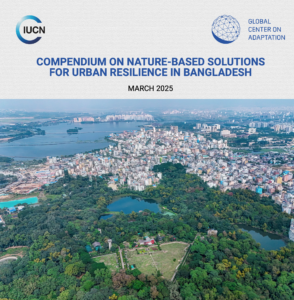GCA Launches Bangladesh’s First National Compendium on Nature-Based Solutions for Urban Resilience
D
haka, Bangladesh, 30 April 2025 – The Global Center on Adaptation (GCA), in collaboration with IUCN Bangladesh, today launched the country’s first Nature-Based Solutions (NbS) Compendium for Urban Resilience at a high-level event in Dhaka.
The Compendium developed with support from the UK Government highlights 20 scalable, context-specific NbS interventions designed to guide policymakers, urban planners, and financial institutions in embedding nature-based approaches into infrastructure development and city planning. It serves as a critical tool to support Bangladesh’s ambition of building climate-resilient cities under the Improving Urban Governance and Infrastructure Program (IUGIP), financed by the Asian Development Bank (ADB) and Agence Française de Développement (AFD).
The launch event brought together senior government officials, development partners, academics, and representatives from local governments, including participants from the Ministry of Environment, Forest and Climate Change (MoEFCC), Local Government Engineering Department (LGED), Urban Development Directorate (UDD), the Bangladesh Planning Commission, Bangladesh University of Engineering and Technology (BUET), ADB, and AFD.
Mainstreaming Nature-Based Approaches in Urban Development
Bangladesh, one of the most climate-vulnerable countries globally, faces growing threats from rapid urbanization, flooding, pollution, and ecosystem degradation. Nature-based solutions offer a transformative approach to address these challenges by strengthening climate resilience, enhancing equity, and improving urban livability.
The NbS Compendium draws on locally relevant best practices and offers actionable recommendations for mainstreaming nature-based solutions through strengthened policy alignment, governance coordination, innovative financing, and institutional capacity building. It is intended to support national and local governments—particularly in secondary cities (pourashavas)—in integrating NbS into urban planning and investment frameworks.
The launch event featured keynote addresses, expert panel discussions, and technical reflections. Discussions highlighted key insights and lessons from the Compendium, explored strategies for integrating NbS into urban development planning and policy, and identified pathways to scale up implementation across municipalities. Participants emphasized the importance of institutionalizing NbS approaches within Bangladesh’s broader urban governance systems to ensure sustainable, climate-smart urbanization.
Voices from the Launch
“This Compendium provides a practical roadmap for cities in Bangladesh to adapt to climate change while enhancing livability and green space,” said Feisal Rahman, Senior Specialist and Acting Country Manager at GCA. “By aligning urban infrastructure with ecosystem-based solutions, we can build resilience for both people and nature.”
“This collaboration underscores the power of partnerships in accelerating climate solutions through NbS,” said Raquibul Amin, Head of Program Management, IUCN Asia. “The Compendium marks a major milestone in Bangladesh’s journey toward resilient, nature-positive urban development.”
Amit Datta Roy, Senior Urban Development Officer at ADB Bangladesh, added:
“By equipping municipalities with practical tools, the Compendium operationalizes NbS at the local level, laying the foundation for sustainable, climate-smart urbanization.”
Mr. Iqbal Abdullah Harun, Secretary, Planning Division and Member, Programming Division, Bangladesh Planning Commission, emphasized: “As we align our Public Investment Plan priorities with the 8th Five-Year Plan, the National Adaptation Plan, and other strategies, integrating Nature-based Solutions into our policies to make projects environmentally sustainable becomes even more urgent. The Planning Commission is focused on mainstreaming green and resilient development to achieve a prosperous, climate-resilient, and environmentally sustainable Bangladesh.”
Nathaniel Smith, Team Lead, Climate and Environment, British High Commission Dhaka, reiterated the importance of building stronger partnerships for climate resilience: “The UK Government, through our Bangladesh Climate and Environment Programme, has partnered with GCA and the Government of Bangladesh to strengthen collaboration between local communities, investors, and policymakers to scale up Nature-based Solutions and Locally Led Adaptation in Bangladesh. We believe this compendium is a great example of that in practice. It shows what can be done, what has been achieved, and provides guidance on how we can move forward together.”
Through this initiative, GCA is supporting the Government of Bangladesh in advancing climate-resilient, inclusive, and sustainable urban growth by equipping stakeholders with the knowledge, tools, and partnerships necessary to mainstream nature-based solutions.
Read the full NbS Compendium:
The full NbS Compendium for Urban Resilience in Bangladesh is now available on GCA’s website.
